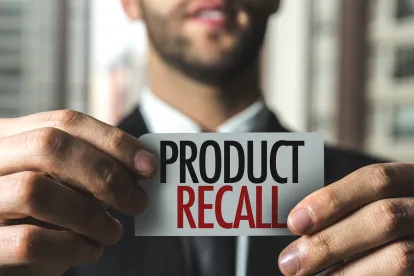In the world of consumer products, the month of May was all about infant sleep products. The CPSC recently approved a new federal standard for infant sleep products for infants up to five months of age since such inclined sleepers, bassinets, and in-bed sleepers that have been linked to multiple infant deaths. Beginning in June 2022, infant sleep products must meet a new federal safety standard. The new federal standard incorporates a voluntary ASTM safety standard with further modifications to strengthen it. If the products do not already meet the requirements of an existing CPSC standard, then the products must pass testing to confirm that the sleep angle surface is 10 degrees or lower and comply with the CPSC’s safety standard for bassinets and cradles.
The CPSC Commissioners voted 3-to-1 to approve the standard. Three Commissioners issued statements about it. Acting Chairman Robert Adler voted for the standard and issued a statement characterizing it as “one of the strongest, most protective rules I have seen in all my years at CPSC.” Commissioner Peter Feldman also voted for the standard but issued a statement foreshadowing legal challenges to it:
I have voted yes on this final rule, but I would have much rather we adopted the amendment I offered that would have put this rulemaking on a more solid foundation. I fear that legal challenges, which could take years to resolve, will end up costing more time and resources than the Commissioner has to spare.
Commissioner Dana Baiocco voted against the standard and also issued a statement. She claimed she supported the rule in spirit but expressed procedural concerns about adopting the standard and practical concerns about the standard’s application to the bedsharing community:
In its practical application, the final rule, which goes into effect in 12 months, will limit the infant sleep product market to cribs (full and non-full size), play yards, bassinets and cradles, and bedside sleepers. In other words, regardless of whether a product was previously available for parents to select in accordance with their life style or personal beliefs, if it does not fit into one of these categories and comply with the corresponding safety standard, it must be “redesigned.” The products that are not or cannot be redesigned will be banned de facto. The result will impact, in whole or in part, the bed-sharing community.
Commissioner Baiocco observed that the medical community does not support or encourage bed-sharing, where the infant shares the bed with another individual and may use products such as co-sleepers, in-bed sleepers, or loungers to do so. Nevertheless, consumers use bed-sharing to resolve space issues or housing limitations and she fears the new standard will leave the bed-sharing community with a product void.
Two companies also recalled products related to infant sleep last month. First, an importer recalled a sleeper accessory that is a hybrid between a bassinet and inclined sleeper. The importer recalled the infant sleep product due to risk of suffocation. Second, an importer recalled infant sleep bags for 0 to 6 months due to risk that the infant’s head can slip into and be covered by the sleep bag, posing a risk of suffocation.
Lawyers from Hunton Andrews Kurth LLP’s insurance coverage practice provides an update on a recent recall-related insurance coverage dispute:
Landec Corp. recently sued two Lloyd’s syndicates in a California federal court after the insurers denied coverage for over $5 million in losses related to a government-ordered recall of kale salad products. According to the complaint, in 2019 the Canadian Food Inspection Agency initiated a recall of Landec’s kale salad kits after a test revealed the presence of the harmful bacteria Listeria monocytogenes. Landec alleges it promptly submitted its claim for coverage under its policy, which explicitly included “product contamination” coverage for government-ordered recalls. The insurers investigated the claim for over a year—and even renewed the policy for a 60% premium increase—but ultimately denied Landec’s claim.
The insurers argued that Landec’s losses were not within the scope of coverage and, even if they were, certain policy exclusions precluded coverage. In particular, the insurers argued that coverage was barred because the 2019 recall arose from the same or similar circumstances surrounding a prior 2018 voluntary recall of kale products, which Landec knew about before the inception of the policy. The insurers also argued that Landec’s losses were excluded because they were due to customers not purchasing products other than those recalled as part of the 2019 recall.
According to Landec, the insurers’ position is premised on a “strained interpretation of the Policy and the facts.” Landec contends that the insurers’ improper disclaimer constitutes a breach of the insurance policy, a breach of the implied covenant of good faith and fair dealing, and a violation of the California Business and Professions law. In support of its bad faith claim, Landec cites the insurers’ unreasonable delay in denying coverage due to a purported investigation when the insurers’ position from the outset was that the policy provided no coverage and that they increased premiums compared to prior policy periods despite interpreting the policy in a way that substantially limits or eliminated coverage without informing Landec of any reduction in coverage. Landec seeks compensatory damages of not less than $5.5 million, as well as punitive damages. We will continue to monitor this lawsuit for further developments.
Total Recalls: 27
Hazards: Fire/Burn/Shock (5); Fall (5); Injury (5); Violation of Federal Standard (4); Crash (2); Choke (2); Suffocation (2); Entanglement (1); Failure to Alert (1)








 />i
/>i

